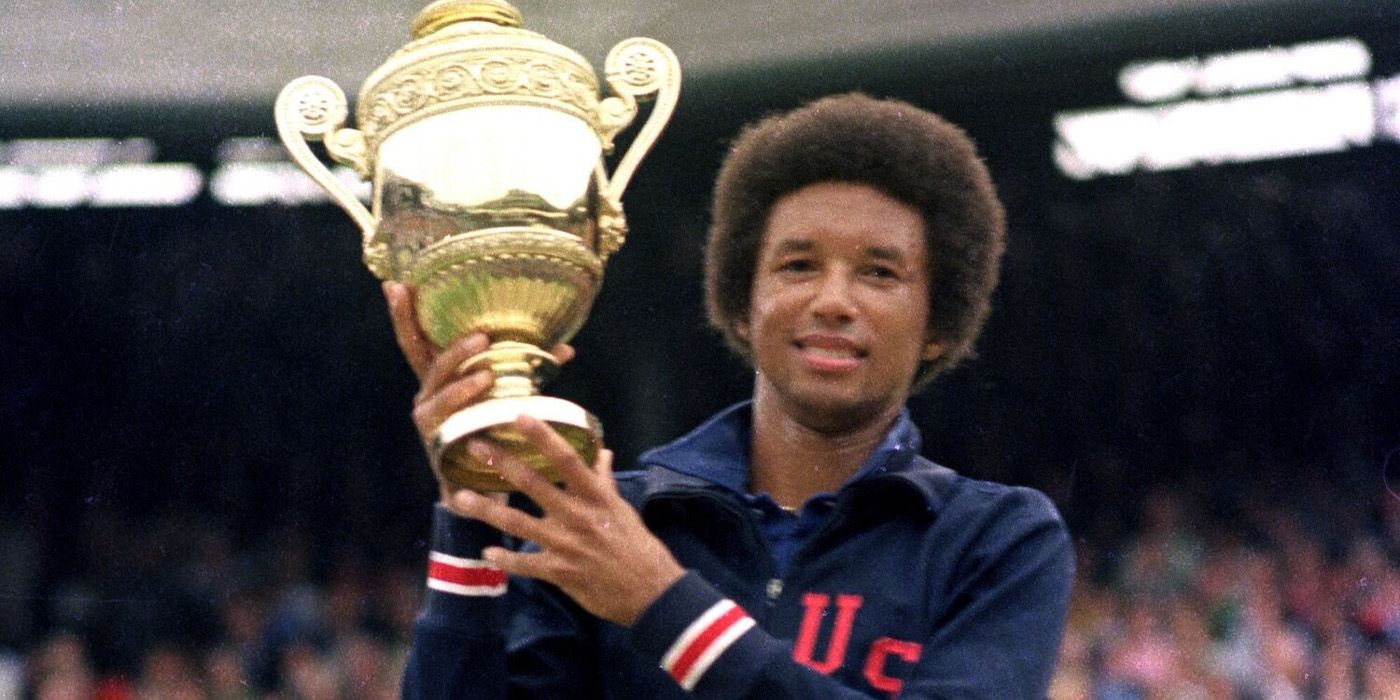If you were looking for an explanation of “Who was Arthur Ashe?” and felt like watching a movie rather than just reading his Wikipedia entry, then you could turn to Rex Miller and Sam Pollard’s new documentary Citizen Ashe. The problem is that asking who Ashe was is already a baffling one since it’s not like he’s an unknown figure. He was the first Black man to win Wimbledon and one of the greatest tennis players of all time. The documentary tries to probe a bit deeper by examining Ashe’s hesitance to engage in social issues, and in these moments the film is at its best because it shows that the way people come to activism is both more complicated and personal than simply having a platform. But overall, Citizen Ashe never does more than glide along the surface of Ashe’s life, which makes it a deflating sports documentary.
Arthur Ashe was a groundbreaking tennis player. In a time where the sport was dominated by whiteness, Ashe broke through due to his undeniable skill and resilience. However, he was also someone who “played the game” of social niceties (i.e. White supremacist demands) and while other Black athletes were making political stands in the 1960s, Ashe held back. It wasn’t until the 1970s that Ashe became more politically active and then used his success and his platform to draw attention to causes beyond his sport. The documentary chronicles his life while trying to balance his success both on and off the tennis court.
Citizen Ashe is fascinating when it explores Ashe’s activism because we’ve become so polarized today that the notion of someone not immediately throwing themselves into the middle of the fray is supposedly cowardice. But the documentary does a good job of explaining Ashe’s demeanor and personal history. This was a man who didn’t want to embarrass his rigid, disciplinarian father, and he also had been engrained with the values to not make waves in his sport. Whereas later a player like John McEnroe could be admired and even beloved for his temper and antics on the court, that privilege was denied to someone like Ashe, who had to be an exemplar to his race even when there were clubs in the South that wouldn’t let him play there under any circumstances.
However, beyond exploring this racial dynamic, Citizen Ashe largely holds back on any other complicating figures or controversies in Ashe’s life to where he seems like a largely normal, unremarkable guy except for his remarkable tennis skill. For fans of tennis (and even casual observers), it’s great to see the film breakdown his strategy against rival Jimmy Connors at Wimbledon 1975, but even here, the film seems reluctant to say that Ashe changed the game in any major way. While it tries to link protests from current major athletes to Ashe, it never connects that Ashe in particular was a driving force more than his contemporaries like Muhammed Ali and Kareem Abdul-Jabar. That’s not to say Ashe wasn’t a part of that movement, and Citizen Ashe does a good job explaining why he was slower to it than others, but it doesn’t make him notably different beyond that initial reluctance.
On the one hand, I liked Citizen Ashe because I didn’t really know anything about him other than his last name is a perennial crossword clue. While Wikipedia exists, the documentary has a nice flow and it’s certainly the more entertaining way to learn about Ashe’s life. But at the same time, it feels a bit superficial and doesn’t build outwards or inwards to look at the complexities of the time or the complexities of the individual. They’re smoothed out into what almost amounts to a bit of a hero worship. That kind of hagiography isn’t too offensive when the stakes are so low—after all, Ashe wasn’t a political leader but rather a tennis player. And yet for those looking for a doc that delves deeper, they’ll find that Citizen Ashe is largely a recounting of what they already know.
Rating: C+
Citizen Ashe is playing as part of the 2021 Telluride Film Festival. The film is slated to open in 2022.

